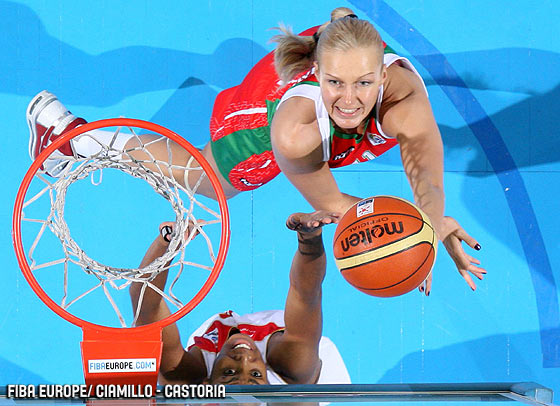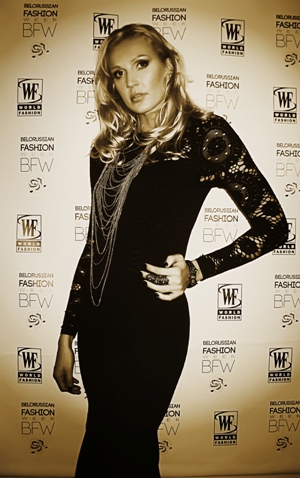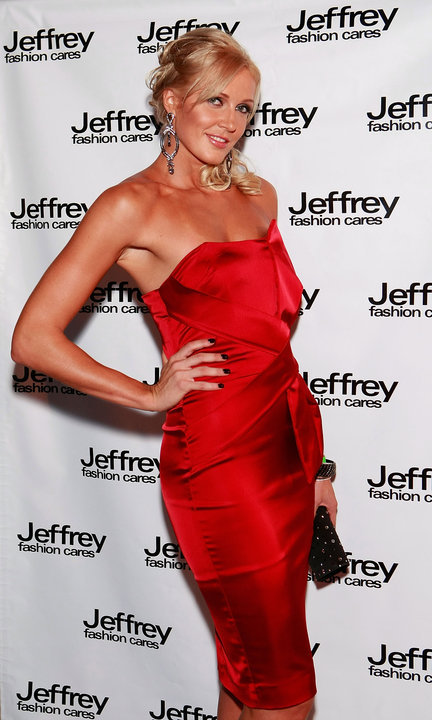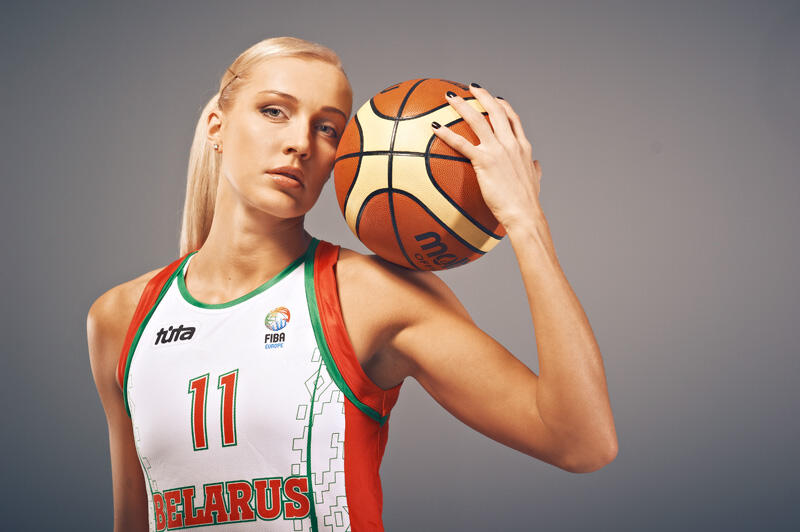She is one of the best basketball players in the world and the only Belarusian playing in the Women's National Basketball Association (WNBA). She is the best frontcourt of World and European Championships in 2010. Yelena Leuchanka tells about women’s way in men’s sphere, i.e. professional basketball.
It may happen that an avocation turns out to be in the sphere, which the society has allocated for the other gender. In that case an individual has to overcome the stereotypes and that is not at all easy. Male hairstylists and teachers and female soldiers and sports practitioners had to go through that struggle. Ambitiousness, assertiveness, determination and will-to-win spirit have traditionally been seen as men’s qualities. Anecdotal evidence may be ruined by the story of a Belarusian girl Yelena Leuchanka, who has comprehensively realized her potential in a genuine men’s ambiance, i.e. in professional basketball.
Presently, Yelena Leuchanka plays at frontcourt position. She plays for the Atlanta Dream in the Women's National Basketball Association (WNBA) and Chinese Liaoning. She participated in Beijing Olympic Games and European Championships in 2007, 2009 and 2011.
On childhood
In her childhood a future sportswoman faced misunderstanding in her family as to her potential occupational choice.
Yelena: I was always a tall girl. My mother has developed a theory, according to which I would be even taller, if I go in for sports. Therefore, at first I practiced dances and then played the piano, making my mother most happy. But once school physical exercises instructor suggested that I should try basketball, given that I was so tall.
I began attending training sessions. Gradually they grew on me and I realized that it is mine. When the teams were set up I was always nominated into the team, where I felt needed. On the one hand, I have had my mother’s willingness to see me dancing and playing piano, but on the other hand, there was the basketball, not at all a female sport, but the one, where I found myself. That resulted in family conflicts, when my mother was arguing that I would be even taller, while my father took my side by saying: “Much good may it do her!”
The feeling that she had made the right choice was punching Yelena up in overcoming barriers on her own way. But from time to time she had to make sacrifices and do what her mother wanted.
Yelena: I remember the moment, when two years were left to my graduating from a musical school but I had to go to a basketball competition. My mother was standing at the doorway not letting me go. Now I realize that being a child at that time I could give up. But I traded off by saying that I would definitely graduate from the musical school but then she would be obliged to let me play basketball. I did graduate from it and handed my mother the certificate.
Her childhood and schooling Yelena spent in the city of Gomel. When she was fourteen, she was invited to the School of Olympic Reserve in Minsk. At seventeen she left for the United States for studying and playing basketball professionally. Sportswoman is grateful to her parents for giving her a chance for a choice.
On personal qualities
Going in for sports has helped the girl to develop necessary features for going on with her favourite pursuit against all the odds.
Yelena: Basketball might be seen as men’s sport but it has inspired me with great confidence, efficacy and durability. When the game is over, I experience a sense of satisfaction. I feel charged with adrenalin, even when I am run into the ground and wiped out, and still I feel my heart’s ease from the work done. It is not at all easy. It means a lot of travelling and staying in hotels but at the end of the day I may say that I am on the right track. This is what I wanted to have.
On gender stereotypes in sports
With the course of time presence of women in sports becomes less and less surprising.
Yelena: It was easier for men than women to make a career in sports twenty or thirty years ago. But the time has changed and women become nations’ presidents and company heads. However, sports have been more popular among men than women.
Men’s basketball may look more spectacular. But if girls could flush, it won’t be definite that people would prefer men’s to women’s matches. Even now there are enough girls in women’s basketball who can slam dunk.
Historically, there have been stereotypes restricting development of women’s sports. They have been the reason for insufficient attention to women’s sports from spin doctors, boomers, marketing managers and organizers of sports’ events. As a result, women’s sports turn out to be by several times less popular and profitable than men’s sports.
Yelena: There is an enormous inequality in sports, which is reflected in huge difference in remuneration in men’s and women’s sports. I am very upset by the lack of attention to women’s sports from companies. They pay more attention to men’s sports in marketing and advertising. Even if they advert to women’s sports, they often forget to show that we, sportswomen are ladylike.
Women’s basketball is less profitable, because traditionally it has been paid less attention to.
Yelena: It’s a pity that in women’s NBA only one team earns money, i.e. the team, which wins. They pay us salaries. However, if the current situation were thoroughly reviewed, it would become clear that men’s basketball generates much more money because it is much better parlayed. For instance, teams in the men’s league earn good money as a result of effective and efficient PR and marketing, selling of tickets and advertising.
People have to get used to new realities. They have to face the truth and drop old stereotypes towards men and women.
Yelena: People have taken it for granted that women in sports are usually tennis and volleyball players. A beautiful woman playing basketball causes astonishment because the stereotype “a female basketball player looks like a man” turns wrong. Because of my height I am often asked in the US whether I play tennis or volleyball. When I answer that I play basketball, there is a surprise. Americans have got a stereotype that manlike women play basketball.

Two women were elected to the International Olympic Committee in 1981. The first Women and Sports World Conference took place in 1994 and passed the Brighton Declaration, which has drawn attention to the international scope of women’s promotion in sports. Women’s presence in sports has not merely become understandable, but acquired value in the society. Yelena Leuchanka has noticed that, too.
Yelena: In the past there were no female referees in men’s NBA. Then they start arguing that women can also run and blow the whistle. So women have got the right of being referees.
Women’s NBA is headed by a woman. However, the owners of women’s teams in the league are mostly men. When I was playing for the Atlanta, its owner was a woman. That fact may give the tone and emotional confidence and is a big step forward in women’s basketball development.
Women prove themselves in big sports as well as men. Belarusian sportswoman believes that much depends on personal qualities, not on the gender.
Yelena: Prior to playing in the NBA, basketball players have to go through the NB Deal – a preparatory league. Throughout its history it has never had a female coach but two years ago Nancy Liebermann was appointed the senior coach of a man’s team. There might be different interpretations of that nomination. Some people may argue that the team will be playing worse. Women are seen as a frail sex but it is not true. Women are much stronger than they may look.
Professional female coach knowledge of basketball, game specifics and her own endeavour there might be better than those of a male coach. However, women are more sensitive. Therefore I wonder about the methods – how will she emotionally cope with male players?
On mission
A young Belarusian girl born at the times of the Soviet Union had nobody to model herself on. She did not know any women to measure up to in the sport that she has chosen for herself.
Yelena: At the beginning of my basketball practicing I had nobody to model myself on. I did not know any compatriot women who could be my icons. So I have focused on myself, actualized myself in basketball and it put a new heart in me. Women’s NBA was established in 1996 and before falling asleep I fancied myself playing there. There were no NBA TV broadcasts at that time and I could not watch the games. I did not know why but I have got a feeling that I would play there. I wished that so much that I have got a real inspiration. Nobody would be able to break my dream. I have undergone 4 surgeries and missed the drafting. I came to the US by myself, with no parents. But I was able to achieve a lot for my sake. After injuries I was persuading myself but not the people around me that I could and would do everything, which is important to me. I would like women to know that only them but nobody else should decide what to do in their lives. I am sure that everybody has got his or her own destiny. The one who meets his/her faith will be happy. As to myself, I believe that I am happy.
Yelena Leuchanka’s story is a good example that pursuing of one’s avocation cannot be divided into masculine or feminine. Being a woman she successfully realized herself in a typical male ambiance. Division into male and female roles and professions has been changing and the distance between them shortening. Of great importance is the recognition that equality approach in any sphere will provide an enormous capacity for a personality development, irrespectively of the gender.
Information sheet*
Name: Yelena Leuchanka,
Height: 195 cm,
Position: frontcourt,
Date of birth: 30/04/1983,
Place of birth: city of Gomel,
First coach: Victor P. Orlov
Basketball school: RUOP (Minsk).
TITLES:
1998 – Fourth place at World Junior Games (Moscow);
1999 – Best frontcourt at the European cadettes’ championship;
2000 – Baltic League champion. Awarded the title of the most useful basketball player of the League;
2002 – Among the top ten US colleges’ players, according to KODAK version;
2003 - Among the top ten US colleges’ players, according to KODAK version;
2007 – Champion of Lithuania with TEO basketball team; European championship bronze medallist with the Belarusian national team;
2008 – Russian Super league bronze medallist with UGMK team; Russian Cup silver medallist with UGMK team ; Euro league bronze medallist with UGMK team; Sixth place at Beijing Olympic games with the Belarusian national team; among the top ten European female basketball players;
2009 - Russian Super league champion with UGMK team; Euro league bronze medallist with UGMK team; fourth place at the European Championship in Riga with the Belarusian national team;
2010 – Turkish Championship silver medallist with Galatasaray team; Turkish Cup winner (MVP-final); eastern Conference winner with the Atlanta Dream;
WNBA finalist with the Atlanta Dream; fourth place at the World Championship in the Czech Republic with the Belarusian national team; awarded the title of the best frontcourt of the World Championship (included into the top five players of the tournament); best player in Belarus; among the top five female European players;
2011 – Participated in Euro league All Stars; Champion of Poland with Krakow Vistula (recognized as MVP of the final).
Club career
1996/1999 – BelGUT – Vedritsa (Gomel);
2000– Horizont (Minsk);
2000/2002 – Seminole (Junior Colleges Association, NJCAA, USA);
2002/2003– Wabash Valley (Junior Colleges Association, NJCAA, USA);
2003/2006– Western Virginia (NCAA University);
2006– Charlotte Sting (WNBA);
2006/2007- ТЕО (Vilnius, Lithuania);
2007 - Estudiantes (Spain);
2007/2008 – ТЕО (Vilnius, Lithuania);
2007г. – Washington Mystics (WNBA);
2008/2009 – UGMK (Yekaterinburg, Russia);
2009/2010 – Galatasaray (Turkey);
2010 – Atlanta Dream (WNBA);
2010 – Gorzów (Poland);
2011г. - Vistula (Krakow, Poland);
2011/2012 - UGMK (Yekaterinburg, Russia);
Yelena Leuchanka’s official website: www.elenalevchenko.by





